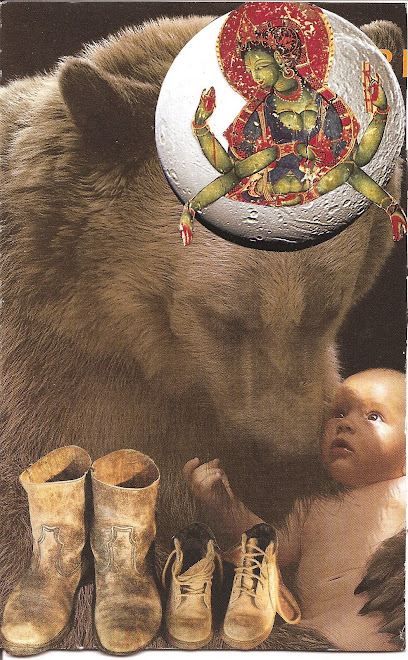 I find a connection with a new friend -- the filmmaker Guy Maddin. He tells me, "If you can find the story about Guy's third birthday party and the monkey, you need to. It's hilarious." David has rubbed elbows with Guy. He's probably heard the story from Guy's lips, as opposed to second-hand. It may be an apocryphal tale in every way --hidden, esoteric, and spurious -- but that doesn't alter it's power or its truth. That's the thing about fiction. It can be in every sense a lie, names changed, events altered, fantastical, and yet it can contain essential truths far more profound than any work of "non-fiction." Of course you could argue that all of it is fiction, more or less. I would. That's another rant for another blog.
I find a connection with a new friend -- the filmmaker Guy Maddin. He tells me, "If you can find the story about Guy's third birthday party and the monkey, you need to. It's hilarious." David has rubbed elbows with Guy. He's probably heard the story from Guy's lips, as opposed to second-hand. It may be an apocryphal tale in every way --hidden, esoteric, and spurious -- but that doesn't alter it's power or its truth. That's the thing about fiction. It can be in every sense a lie, names changed, events altered, fantastical, and yet it can contain essential truths far more profound than any work of "non-fiction." Of course you could argue that all of it is fiction, more or less. I would. That's another rant for another blog.Here's the crux of Guy's story: It's his third birthday. He's living in Winnipeg where an arthritic, elderly Hollywood chimp has retired. His parents hire the chimp who arrives in cowboy hat, chaps, and a holster with two six-shooters tugged inside. Remember, this is a Hollywood chimp and since Guy is my age roughly, parties were often accompanied by alcohol, especially when parents attended. The first thing the chimp does is find some untended glasses of scotch and then head to the piano to "play," (as if he was Noel Coward or Cole Porter, or Jerry Lewis' smarmy alter ego in The Nutty Professor). An enchanted young Guy joins the monkey at the piano bench and attempts to join in. The monkey, taking W. C. Fields to heart, grows jealous of Guy and starts to pistol whip him until he tumbles to the floor, cracking his head loudly. At this point the monkey goes berserk, a mini King Kong, and leaps to the dining room table to make his escape, stepping in Guy's birthday cake, drinking a pitcher of Nestle's Quik hoping for more scotch, and, facing imminent capture, leaps to the curtain, struggling to the top as if he's scaling the Empire State Building.
I share this story with another friend, the one who introduced me to Guy's films. He snorts and says, "You believe that?" At that moment, I realized it doesn't matter whether the story is completely true. It doesn't matter if it's been tailored, cut to suit, embellished. This is Guy's story and it's one that many know. It has taken on a life of its own as I found out by reading Guy's blog. He's in Berlin, nominated for a Berlinale, and recounting this sad tale, and suddenly a version is being acted out before his eyes and the eyes of the other attendees. The story has moved to fable, myth, and speaks not just to Guy, but to others. There's no fireside, but in such a way the first stories must have found their way to myth, through telling, through living, through assuming and re-enacting. Isn't this how the first theatre was born in Greece?
Guy's films are known to be autobiographical but not in the typical way. They are dreamy, sometimes disturbing, sometimes lyrical, always visually arresting. They are lives the way our soul might tell them, if our vast unconscious could tell the tale and not rely on consciousness and words to be its scribes. We do write ourselves. Some artists, like Guy, openly admit it. The way we do it though, the "reality" of our telling, that becomes the question. He could spill his guts about all the sad and beautiful ephemera of his life or he can interpret, envision and re-vision, he can spin his tale as Homer spins The Odyssey, making magic of the ordinary, and in doing so, make it far more powerful, more truthful, and imminently more "real."
In my clumsy way, I co-opted my parents' tale of meeting and marrying. I honored the tale much as Berlin honored Guy's. These are our fairy tales, our fables, the myths that make us. They inhabit us as the myths of our culture do. We write ourselves as we write those we love and hate and all the myriad states between. I think when we get old enough to return to fairy tales we realize they aren't just pretty fictions, but the very bones and blood, the stories of our lives.





No comments:
Post a Comment